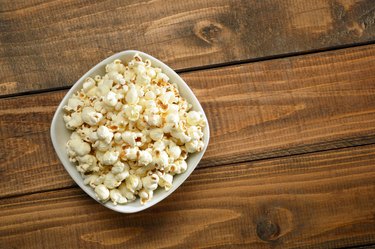
Diverticulitis is a medical condition that occurs due to inflammation of the colon. This condition can cause a range of different gastrointestinal complications. To prevent diverticulitis from worsening, you should consume a diet high in fiber while avoiding foods that are harmful to your gastrointestinal tract.
Read More: All About Diverticulitis
Video of the Day
Video of the Day
Diverticular Disease
Diverticular disease is a condition of the gastrointestinal tract. It starts with the colon and a condition known as diverticulosis.
Diverticulosis causes pouches to protrude through weak points in your colon. This condition can be harmless, or it can turn into diverticular disease. This can lead to bleeding, gastrointestinal symptoms or diverticulitis, a medical condition that can become serious if left untreated. While diverticulosis is quite common, a small percentage of people develop diverticulitis and its associated complications.
Diverticulitis is basically inflammation of the pouches that have formed in diverticulosis. Diverticulitis, when serious, can lead to problems like abscesses, fistulas, infections, obstructions and tears.
Even when secondary complications don't occur, the flare-ups that occur can be unpleasant, painful and may even require hospitalization. Treatment of this condition typically involves the consumption of foods that are high in fiber, like whole grains, and foods that are rich in beneficial bacteria, like fermented foods. However, at other times, you may be required to consume a restricted diet consisting of broths and juices or low-fiber foods.
Read More: Digestive Conditions
Foods to Avoid With Diverticulitis
At one point, a wide variety of foods were considered to be dangerous for people with diverticulitis. These foods included popcorn, nuts and seeds. Even the seeds in fruits and vegetables were considered potentially harmful. These days, there's less emphasis placed on problems with consumption of these foods. However, certain diets may make you prone to developing diverticulitis and may increase the chance of complications related to the disease.
In particular, diets that are low in fiber, high in animal protein and high in fat from animal sources can increase the likelihood of developing diverticulitis. If you already have diverticulitis and have been into high-fat milk products or a high-protein diet, you may need to restructure how you eat.
You can replace animal protein with alternative protein sources, like legumes and tofu. You can also trade in your high-fat milk or other dairy products for low-fat dairy alternatives or even alternative, plant-based milk products.
You don't have to eliminate meat and dairy from your diet entirely, but reducing your consumption of these products will improve the health of your digestive system. Vegetarians and vegans are actually less likely to develop diverticulitis thanks to their consumption of fiber-rich fruits and vegetables.
Treatment of diverticulitis can involve medicines like anti-inflammatories and antibiotics, but almost always requires the consumption of foods that are high in fiber and beneficial bacteria, too. While you can obtain beneficial bacteria from probiotics, it's also possible to get these from fermented food products.
Consumption of fruits and vegetables rich in fiber will improve the health of your gastrointestinal tract. Other foods rich in fiber include whole grains and cereals. Fermented foods are easily accessible, too, and include products like kimchi, natto and miso. However, not all fermented foods contain sufficient probiotics, so you may need to supplement your diet accordingly.
- JAMA: Nut, Corn and Popcorn Consumption and the Incidence of Diverticular Disease
- NIH: Digestive Diseases: Diverticular Disease
- UCSF Health: Diverticular Disease and Diet
- Gut and Liver: Diverticular Disease: An Update on Pathogenesis and Management
- Neurogastroenterology and Motility: Changing views on diverticular disease: impact of aging, obesity, diet and microbiota
- Alimentary Pharmacology and Therapeutics: Review article: the pathophysiology and medical management of diverticulosis and diverticular disease of the colon
- BMJ Gut: Colon: Source of dietary fibre and diverticular disease incidence: a prospective study of UK women
- European Journal of Nutrition: High intake of dietary fibre from fruit and vegetables reduces the risk of hospitalisation for diverticular disease
- Dietary Patterns and Whole Plant Foods in Aging and Disease: Dietary Patterns, Foods and Fiber in Irritable Bowel Syndrome and Diverticular Disease
- Evidence-Based Practice: Are there effective dietary recommendations for preventing diverticular disease?
- Advances in Fermented Foods and Beverages: Probiotic Fermented Foods and Health Promotion